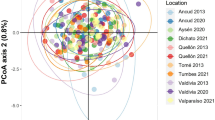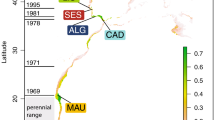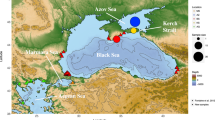Abstract
ELECTROPHORESIS detects only about one third of the genetic variation present in a natural population, despite its wide application1. A combination of electrophoretic and heat denaturation techniques has revealed considerable molecular variation within single electrophoretic classes of enzymes. For example, Bernstein et al.2 have found 1.74 more alleles at the xanthine dehydrogenase locus in the Drosophila virilis group than had been detected by electrophoresis alone. Further such evidence3–11 has concentrated on species of Drosophila. I report here a study of the marine mussel Guekensia demissa (formerly Modiolus demissus) which shows that in two geographically separated populations experiencing different temperature regimes, there is an apparent correlation between the distribution of thermosensitive alleles at the phosphoglucomutase (Pgm) locus and environmental temperature.
This is a preview of subscription content, access via your institution
Access options
Subscribe to this journal
Receive 51 print issues and online access
$199.00 per year
only $3.90 per issue
Buy this article
- Purchase on Springer Link
- Instant access to full article PDF
Prices may be subject to local taxes which are calculated during checkout
Similar content being viewed by others
References
Lewontin, R. C. The Genetic Basis of Evolutionary Change (Columbia, New York, 1974).
Bernstein, S. C., Throckmorton, L. H. & Hubby, J. L. Proc. natn. Acad. Sci. U.S.A. 70, 3929–3931 (1973).
Wright, T. R. F. & MacIntyre, R. J. J. Elisha. Mitchell Sci. Soc. 81, 17–19 (1965).
Singh, R. S., Hubby, J. L. & Lewontin, R. C. Proc. natn. Acad. Sci. U.S.A. 71, 1808–1810 (1974).
Singh, R. S., Hubby, J. L. & Throckmorton, L. H. Genetics 80, 637–650 (1975).
Milkman, R. Biochem. Genet. 14, 383–387 (1976).
Trippa, G., Loverre, A. & Catamo, A. Nature 260, 42–44 (1976).
Cochrane, B. J. Nature 263, 131–132 (1976).
Sampsell, B. Biochem. Genet. 15, 971–988 (1977).
Trippa, G., Catamo, A., Lombardozzi, A. & Cicchetti, R. Biochem. Genet. 16, 299–305 (1978).
Coyne, J. A., Felton, A. A. & Lewontin, R. C. Proc. natn. Acad. Sci. U.S.A. 75, 5090–5093 (1978).
US Department of Commerce Coast & Geodetic Survey, C. & G. S. Publication 31-1, 1st edn (1960) for sea temperatures and Climatic Tables of the Admiralty Pilots (USA) for air temperatures.
Spencer, N., Hopkinson, D. A. & Harris, H. Nature 204, 742–745 (1964).
Scopes, R. K. Biochem. J. 107, 139–150 (1968).
Author information
Authors and Affiliations
Rights and permissions
About this article
Cite this article
GOSLING, E. Hidden genetic variability in two populations of a marine mussel. Nature 279, 713–715 (1979). https://doi.org/10.1038/279713a0
Received:
Accepted:
Issue Date:
DOI: https://doi.org/10.1038/279713a0
This article is cited by
-
Genetic studies of laboratory-rearedMytilus edulis
Marine Biology (1990)
-
Electrophoretic and heat-stability polymorphism at the phosphoglucomutase (Pgm) locus in natural populations of Drosophila melanogaster
Biochemical Genetics (1985)
-
Population studies on human phosphoglucomutase-1 thermostability polymorphism
Human Genetics (1984)
-
Description and genetics of glucose phosphate isomerase (GPI) and phosphoglucomutase (PGM) polymorphisms in Asellus aquaticus (L.)
Biochemical Genetics (1982)
Comments
By submitting a comment you agree to abide by our Terms and Community Guidelines. If you find something abusive or that does not comply with our terms or guidelines please flag it as inappropriate.



